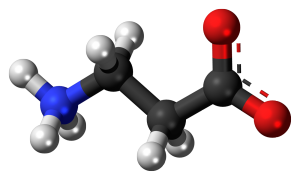Beta-alanine is a naturally occurring modified version of the amino acid alanine. It’s been shown to enhance muscular endurance, and taken orally as a supplement, may also help improve cardiovascular endurance.
When people ingest beta-alaline, it turns into carnosine, a molecule with two peptides, beta-alani ne and histidine. Carnosine in the muscles and brain tissue has an important role in regulating muscle pH. It is stored in cells and released when pH levels drop.
ne and histidine. Carnosine in the muscles and brain tissue has an important role in regulating muscle pH. It is stored in cells and released when pH levels drop.
Muscle pain and fatigue after exercising is a result of muscle acidosis, or an excess accumulation of hydrogen ions in the muscles.
Carnosine may delay the onset of fatigue because it has the capacity to neutralize the excess of hydrogen ions. Beta-alanine supplements have been shown to significantly improve carnosine levels in long muscle fibers of the thighs.
Earlier studies suggest that people with COPD have lower-limb muscle dysfunction. This may be due to a combination of physical inactivity and muscle oxidative stress.
Compared to healthy people, people with COPD have significantly lower carnosine in the vastus lateralis muscle — the largest and most powerful part of the thigh muscle called the quadriceps femoris.
A new randomized clinical trial at Hasselt University in Belgium (NCT02770417) is recruiting 40 COPD patients to evaluate whether muscle carnosine can be increased by taking beta-alanine supplements. Twenty participants will receive the supplements and 20 will receive a placebo. Also, 10 healthy elderly people will be enrolled as a comparison for muscle carnosine levels.
The objectives of the study are to investigate muscle carnosine levels in a larger group of people with COPD to investigate whether beta-alanine supplements increase muscle carnosine, and if it has any impact on exercise capacity, lower-limb function, and quality of life in COPD patients.
The clinical trial will also study muscle characteristics before and after beta-alanine supplements and blood markers of oxidative stress and inflammation in people with COPD.
The study’s estimated completion date is June 2018.
High doses of beta-alanine may cause a tingling feeling called paresthesia. It is temporary and harmless.
COPD News Today is strictly a news and information website about the disease. It does not provide medical advice, diagnosis, or treatment. This content is not intended to be a substitute for professional medical advice, diagnosis, or treatment. Always seek the advice of your physician or other qualified health provider with any questions you may have regarding a medical condition. Never disregard professional medical advice or delay in seeking it because of something you have read on this website.